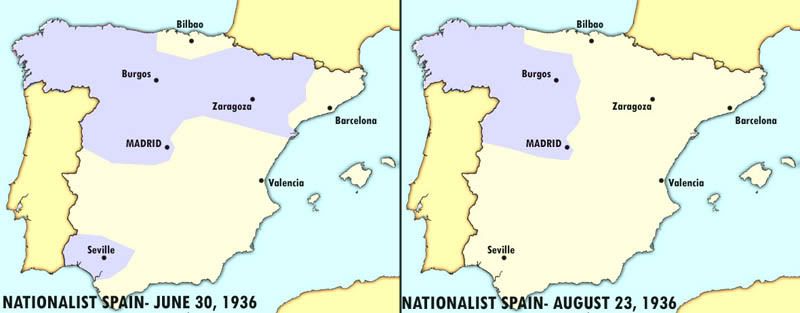Boehm- Welcome aboard!
TC- We shall see. I've already killed off one old character and shunted another into academia.

Sir Humphrey- Thank you, sir!
DK- Thanks! Hemingway is a must read for anyone who wants to write a battle scene.
August 4, 1936
Shaughnessy hit the first rock and it slid out from under his boot. He landed hard, skinning the knuckles on his right hand. He kept running, shouldering his rifle to flex the fingers. If he got a cramp now, he was dead, like the hundred men he'd already killed by his example.
A few bullets pinging off the rocks. The slope was dry enough that he could move quickly once the river mud was off his boots, but there were rocks everywhere. He had to pick his way up. More mortar shells coming in. The rocks would just add to the shrapnel. His uncle had come home in pieces from the Alps in 18, without a single scrap of metal in him. It was flying granite that had cut him to shreds.
Ostrowski clutching at his elbow, helping him through a tangle of roots. The boom of the artillery- the Italians had got it moved around and figured the range. Shaughnessy felt it instead of hearing it. He got his rifle off his shoulder and fired a defiant shot. The shell went off behind him, clearing a red aisle through his battalion.
About halfway up. The Italians were up there and the bullets were coming faster now. Shaughnessy tumbled down, crawling on his hands and knees. Slow going. He took a couple of shots.
"KEEP MOVING!" he roared. "SUPPRESSING FIRE, BUT DON'T STOP NOW OR YOU WON'T GET MOVING AGAIN!"
He fired another shot, and an Italian fell out of sight, a little puff of dust and red mist. He parked himself behind a large rock and fired three more times. He glanced backwards. The men were still moving. A few hundred meters over, the Regulars were crossing the stream, and their mortars were firing fast now, keeping the pressure on.
Shaughnessy only had another ten or fifteen meters to go. His men were clumping up. He gestured a group to move right- no sense making a big target for the machine guns when they appeared. He climbed over the rock and kept moving.
He could hear the Italians now. Thank God, he wasn't deaf. With a final scream, he attached his bayonet and ran the final distance.
He crested the ridge, and he could see the Italians stare at him in horror. He fired, and one dropped. Suddenly, he was on his side, blinking stupidly.
I was knocked over on my face. Some goddamn idiot shot me from behind. Shaughnessy snarled and kept firing wide. The Italians ducked and scrambled backwards from the ridge.
"COME ON! COME ON, DAMMIT!" Shaughnessy got to his knees. He fired again, and then fell back over. His clip was empty. He fumbled for another. More men coming over the top now. The artillery, booming in the other direction, at the Regulars. He saw Italian uniforms moving north, and now screaming horses. He crawled to a tree and half-stood, half-climbed to his feet.
The Regulars were moving up the slope. His battalion was running past him, maybe fifty men left. The Italians were running. He'd won. They'd won.
Shaughnessy slumped over. He was tired of fighting to keep his feet. Something horrible was happening in his gut. Pierre Shaughnessy let his head fall into a patch of cool moss and wildflowers. He closed his eyes, and the smell of powder and blood gave way to sweet fragrance, and he slept, a just and triumphant man.


